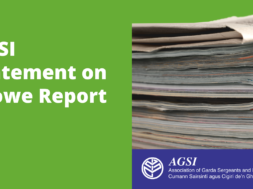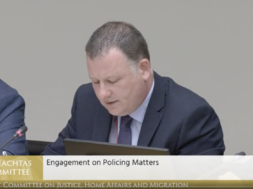Garda Síochána (Policing Authority and Miscellaneous Provisions) Bill 2015 Seanad Éireann
Check Against Delivery, June 9th 2015
Second Stage Speech by the Minister for Justice and Equality
Frances Fitzgerald TD
Garda Síochána (Policing Authority and Miscellaneous Provisions) Bill 2015
Seanad Éireann
Cathaoirleach,I move that the Bill be read a second time. Senators will recall that when I assumed my present office I committed to delivering a sea-change in the oversight of policing in this state. Since then I have worked with the Cabinet Committee on Justice Reform to deliver a comprehensive programme of reform of the oversight, governance and accountability of the Garda Síochána. The overall objective of this programme is to ensure that the confidence of the public in the Garda Síochána is maintained and to bring forward necessary changes, so that the high quality and respected service that the Garda Síochána has provided is continued and enhanced to better meet the realities, requirements and expectations of 21st century policing.
Reform:
As part of the Justice Reform Programme:
- The Government held, for the first time, an open and independent selection process for the position of Garda Commissioner.
- A similar open and independent selection process is currently underway for two positions of Deputy Garda Commissioner.
- Legislation was introduced and enacted to strengthen the role and remit of the Garda Síochána Ombudsman Commission (GSOC).
- A Commission of Investigation, being chaired by Justice O’Higgins, has been established and is currently examining matters in the Cavan/Monaghan Garda Division. The terms of reference are fully in line with those recommended in the Guerin Report.
- The Independent Review Mechanism, consisting of a panel of counsel, is currently examining over 300 complaints alleging Garda misconduct or problems with investigating misconduct.
- Earlier today I announced that I have appointed retired High Court Judge Mr. Justice Roderick Murphy to independently oversee the issuing of responses to complainants.
- The Protected Disclosures Act 2014 has amended the Garda legislation to allow Garda members to make “protected disclosures” to GSOC in confidence in respect of alleged Garda misconduct.
- The Freedom of Information Act 2014 extends to the Garda Síochána.
- The Garda Professional Standards Unit (GPSU) on the operation of the fixed charge processing system (penalty points) was published; and in response I appointed Judge Matthew Deery, former President of the Circuit Court, to the new position of Independent Oversight Authority for the fixed charge processing system.
In November 2014, the Garda Inspectorate published a comprehensive report on Crime Investigation. Significant work is underway to implement its recommendation including:
- review of crime counting rules by the CSO;
- establishment of a Data Quality Team in An Garda Síochána;
- significant reorganisation and amalgamation of Garda national units including a new amalgamated ‘Drugs & Organised Crime Bureau’ and a new national ‘Child Protection, Domestic Violence and Human Exploitation Unit’;
- establishment of a Criminal Justice Steering Group to provide greater coordination between all bodies operating the
- Criminal Justice system;
- establishment of a new Garda Incident Recording Process;
- establishment of a Victim Support Office in every local Garda division.
Resources:
In addition to reform, the Government and I have also focussed on resources.Last September, this Government reopened the Garda College for new recruits for the first time since 2009. We will not let it close again to new recruits.
Three hundred have already started their training. The first 99 have attested and are now working in communities nationwide. We promised seamless ongoing recruitment and we are delivering on that promise. 250 more recruits will enter Garda College over the coming months.Significantly, each intake will comprise 125 recruits, an increase from the 100 recruits taken-in as part of the first three tranches since recruitment recommenced last September. This ramped-up recruitment signifies the determination of Government to delivering an effective, responsive police service to protect our communities and respond to emerging crime trends.The additional recruitment will bring to 550 the total number of Gardaí that will have been recruited by this Government between September 2014 & 2015. Additional recruitment is being further supported by reforms and efficiencies measures. For example 125 Gardaí are returning to frontline policing as a result of civilianisation of Garda immigration functions at Dublin Airport. In addition, due to reforms in rural policing, the Garda Commissioner estimates that there are 61,000more man hours available for frontline services following the station closuresOf course, recruiting Gardaí could prove futile unless they are properly resourced. Critical to this is ensuring that Gardaí can be mobile, responsive and visible in the community,To date, this Government has invested nearly €29 million in new Garda vehicles since 2012, marking a massive increase on the €4.8 million provided for by the previous Government in Budgets 2009-2011. The latest 370 new Garda vehicles have begun coming on stream since the start of this year. In addition, I recently allocated a further €700,000 for new specialised vehicles to support Gardaí in responding to current and emerging crime threats, including those committed by highly-mobile gangs.Budget 2015 also contained an additional €4 million for ICT – and that’s just the beginning.We can all agree that out-dated paper-based practices must be consigned to history and we must move with confidence; and resources, into the digital era. The recent report of the Garda Inspectorate on Crime investigation has highlighted many of the issues that need to be addressed. With my support, the Commissioner established a multi-agency working group to develop a coherent long-term ICT strategy. I expect to be in a position to make some substantial announcements very shortly.
Policing Authority:
I now turn to the Policing Authority.The establishment of an Independent Policing Authority is at the core of the Government reform programme and represents the most far reaching reform of the Garda Síochána since the foundation of the State.The Authority will provide a new independent and dedicated forum for the public oversight of policing services in Ireland. It will also provide a new engine to drive reforms of the policing system and practices, to ensure that the Garda Síochána is fit to address the ongoing and emerging challenges of modern policing.The new Authority will have extensive functions, many of which are currently exercised by the Government or the Minister for Justice and Equality. In particular, these functions will be concerned with overseeing the governance, structures and performance of the Garda Síochána in the policing area. The bill before the House proposes that the Authority will, in particular, have responsibility for:
- overseeing the performance by the Garda Síochána of its policing functions under a broad range of headings;
- nominating persons for appointment by the Government to the posts of Garda Commissioner and Deputy Garda Commissioner;
- appointing persons to the ranks of Garda Superintendent, Chief Superintendent and Assistant Commissioner – and removing them for reasons related to policing services;
- appointing persons to senior positions within the Garda civilian staff;
- determining Garda priorities in relation to policing services;
- approving the 3 year Garda strategy statement;
- approving the annual Garda policing plan;
- establishing a Garda code of ethics; and
- promoting and supporting the continuous improvement of policing in the State.
The Bill also enables the Authority to request the GSOC and the Garda Síochána Inspectorate to initiate an inspection or inquiry or to examine Garda practices or procedures.The legislation has been developed taking into account the outcome of an extensive process of consultation. This included a Government consultation process in May 2014, a seminar I hosted in Farmleigh in June 2014 and the detailed consideration of the Garda Síochána Act 2005 by the Joint Committee on Justice, Defence and Equality. The provisions of the Bill are generally in line with the General Scheme which was published in November 2014 and which was broadly welcomed by the Joint Committee in the course of its pre-legislative scrutiny.The proposals in the Bill have been prepared in close consultation with the Office of the Attorney General, taking full account of the requirements of the Constitution. In particular, consideration has been given to the fact that, under Article 28, as interpreted by the Courts, there are restrictions on the extent to which it is open to the Government to delegate important functions relating to the executive power of the State to another body.Overall, the proposals for the Policing Authority are designed to strike the right balance between, on the one hand, the exercise by the Authority of effective and meaningful oversight of the policing functions of the Garda Síochána and, on the other hand, the retention by Government of essential residual powers in relation to policing. In recognition of the constitutional position of the Executive in relation to policing, the Bill provides that a number of Authority functions will require the co-agreement of the Minister.
Security:
National security is a vital function of Government and the Garda Commissioner will continue to account fully to the Minister and the Government in relation to security matters.The Bill contains a definition of “security services”. The purpose of this definition is purely to determine which functions of the Garda Síochána will be overseen by the Minister for Justice and Equality and the Government, rather than the Policing Authority. It is important to bear in mind that the Bill does not seek to confer any further security-related powers or functions on the Garda Síochána. The definition contains an exclusion for lawful advocacy, protest or dissent. The definition was carefully considered in close consultation with the Office of the Attorney General. The definition encompasses, among other matters, functions linked to offences under existing legislation, including offences under the Offences against the State Acts 1939 to 1998 and the Criminal Justice (Terrorist Offences) Act 2005; and also espionage and sabotage.
Chair-designate & Membership:
Following a process undertaken by the Public Appointments Service seeking expressions of interest, the Government has nominated Ms Josephine Feehily as the Chairperson-designate of the Authority. Ms Feehily is assisting in the preparations for the establishment of the Authority. The selection process for the eight ordinary members of the Authority will shortly be undertaken by the Public Appointments Service. This will allow the Authority to commence its operations as soon as possible after the Bill is enacted.
Specific content of Bill:
I now turn to the specific content of the Bill which Bill comprehensively amends the Garda Síochána Act 2005 – the “Principal Act” – to incorporate the Authority into the existing Garda legislative framework. To facilitate Senators, I have arranged for the circulation of an unofficial consolidation of the Principal Act which includes the amendments proposed in the Bill.
Part 1 of the Bill contains the short title and commencement provisions, as well as definitions and repeal provisions.Section 4 contains a definition of “security services” which is required to help identify the relevant functions of the Authority. As the Authority will not have functions in relation to security services, it is important to provide clarity as to what security services comprehend. The definition does not expand the existing Garda powers in the field of security and provides a specific exclusion in relation to lawful advocacy, protest or dissent. Section 5 sets out, for the first time, policing principles which are intended to underpin the provision of policing services in the State.
Part 2 of the Bill gives the Authority a very significant role in the appointment and removal of senior Garda personnel. Sections 8, 9 and 12 of the Bill make provision for appointments to senior ranks in the Garda Síochána. In particular, under sections 8 and 9, the Government will make appointments to the ranks of Commissioner and Deputy Commissioner solely on the recommendation of the Authority. The Government will be obliged to accept the Authority’s recommendations but may, and only in exceptional circumstances and for substantial and stated reasons, request the Authority to nominate another person in respect of an appointment. Under section 12, the Authority will make appointments to the ranks from Garda superintendent to Assistant Commissioner.Sections 10, 11, 13 and 14 deal with removals. While the Government will retain the power to remove the Commissioner or a Deputy Commissioner, the Authority will be able to recommend a removal from these positions on grounds relating to policing services. The Authority will also be able to remove an Assistant Commissioner, chief superintendent or superintendent on grounds relating to policing services. The Garda Commissioner will be required to obtain the consent of the Authority for the summary dismissal of a member of the Garda Síochána not above the rank of inspector.Section 15 continues the current arrangements for the recruitment of reserve members with a requirement for consultation with the Authority, rather than the Minister.Section 16 requires the Authority to publish, within 12 months of its establishment, a code of ethics for Garda members and civilian staff.Section 17 requires approval for the number of appointments of Garda civilian staff to be given by the Authority. Also, the Authority will directly appoint Garda civilian staff equivalent to or above the rank of chief superintendent.
Part 3 of the Bill sets out the roles that will be undertaken by the Minister, the Authority and the Garda Commissioner. Under section 18, the Authority will, subject to the prior approval of the Minister, determine, and from time to time revise, priorities and performance targets for the Garda Síochána in performing its functions relating to policing services. It also inserts a new section 20A into the 2005 Act to allow the Minister to set priorities and performance targets in relation to security services.Sections 19 and 20 make provision for the Authority, with the consent of the Minister, to approve the 3 year strategy statement for the Garda Síochána and the annual Garda policing plan respectively.Sections 21 and 22 make provision for the 3-year report on the efficiency and effectiveness of the management and deployment of Garda resources and the yearly report of the Garda Professional Standards Unit, respectively, to be submitted by the Commissioner to the Authority, rather than the Minister.Section 23 enables the Minister, following Government approval, to issue a directive to the Authority in relation to policing services. It also allows the Authority to recommend to the Minister that a directive be issued to the Garda Commissioner in relation to policing services.Section 24 modifies the functions of the Garda Commissioner, as set out in section 26 of the Principal Act, to reflect the relationship between the Garda Commissioner and the Authority in relation to policing services. In particular, the Commissioner will be required to assist and cooperate with the Authority in the performance of its functions.Section 25 provides a role for the Authority in seeking the views of the public in respect of matters concerning policing services.Section 26 amends section 32 of the Principal Act to facilitate the appointment by the Minister of an Assistant Garda Commissioner to perform the functions of the Garda Commissioner where the Commissioner or a Deputy Commissioner is not available.
Part 4 makes provision for amendments to sections 35, 36 and 38 of the Principal Act to transfer to the Authority the functions of the Minister in relation to Joint Policing Committees and the establishment of CCTV schemes for the purpose of securing public order.
Part 5 contains amendments to sections 40, 41, 42, 44, 45 and 46 of the Principal Act dealing with the accountability of the Garda Commissioner for the exercise of his or her functions. In particular, the amendment to section 40, provided for by section 32 of the Bill, specifies that the Commissioner will report to the Authority with regard to policing services.
Part 6 contains amendments to sections 52, 53, 55, 56 and 62 of the Principal Act to provide a role for the Authority in relation to the appointment and secondment of personnel between the Garda Síochána and the Police Service of Northern Ireland.
Part 7 inserts a new Part 2A into the Principal Act to provide for the establishment of the Authority, its membership and functions. I will summarise the key provisions involved.Section 62C provides that the Authority will comprise 9 members to be appointed by the Government. The chairperson will be appointed directly by the Government and the other 8 ordinary members will be appointed by the Government from a panel following the holding of a selection competition run by the Public Appointments Service. A resolution of both Houses of the Oireachtas agreeing to the appointments will be required. The section also provides that the chairperson designate will become the first chairperson of the Authority. Additionally, it makes provision for ordinary members designate of the Authority to be the first ordinary members of the Authority.Section 62G provides for the removal by the Government of a member from the Authority following detailed and stringent procedures, including a resolution passed by both Houses of the Oireachtas;Section 62H sets out the functions of the Authority and I have already outlined its key tasks.Section 62J requires the Authority to hold at least one meeting in public with the Garda Commissioner every 3 months and makes provision for attendance by the media and the broadcasting of these meetings.Sections 62S and 62T provide for the Chief Executive of the Authority to account to the Public Accounts Committee in respect of the Authority’s expenditure and to other Committees of the Oireachtas in respect of general administrative matters. The sections will not affect or limit the capacity of an Oireachtas Committee to invite members of the Authority to appear before it.
Part 8 includes amendments to the provisions of the Principal Act relating to GSOC and the Garda Síochána Inspectorate, to take account of the establishment of the Authority. The key amendments include:
- a requirement at section 45 for GSOC to promote mediation and informal resolution of appropriate complaints;
a provision at section 48 to enable the Authority to request GSOC to investigate any matter relating to policing services that gives rise to a concern that a member of the Garda Síochána may have committed an offence, or behaved in a manner that would justify disciplinary proceedings; - a provision at section 49 to enable the Authority, subject to the consent of the Minister, to request GSOC to investigate any behaviour of the Garda Commissioner in the context of his or her functions relating to policing services that leads it to believe that the Commissioner may have committed an offence or behaved in a manner that would constitute serious misconduct;
- a provision at section 52 to allow the Authority to request GSOC to examine practices or procedures of the Garda Síochána in relation to policing services matters;
- a provision at section 53 to enable the Authority to request the Garda Síochána Inspectorate to initiate an inspection or inquiry in relation to aspects of the operation and administration of the Garda Síochána pertaining to a matter relating to policing services; and
- the insertion, by section 54, of a new section 117A into the Principal Act to enable the Minister to request the Authority to monitor the implementation by the Garda Síochána of recommendations of the Garda Síochána Inspectorate.
Part 9 contains miscellaneous provisions, including a provision at section 60 for a review, to commence not later than 5 years after the establishment of the Authority, of the operation of the amendments to be made by the Bill to the Principal Act in respect of the Authority.
Conclusion:
Before I conclude, Cathaoirleach, I would remind Senators that, while the establishment of the new Policing Authority will bring about a fundamental change in the area of policing, this is not an end in itself. More importantly, what the Government justice reform programme is about is ensuring that this country will have the police force it deserves, operating to the highest professional standards and fully capable of dealing with both existing and future challenges.I believe that the new Authority will play a pivotal role in achieving the Government’s objectives in reforming policing in this country, for the benefit not just of the public but also the men and women of the Garda Síochána.I commend the Bill to the House.









